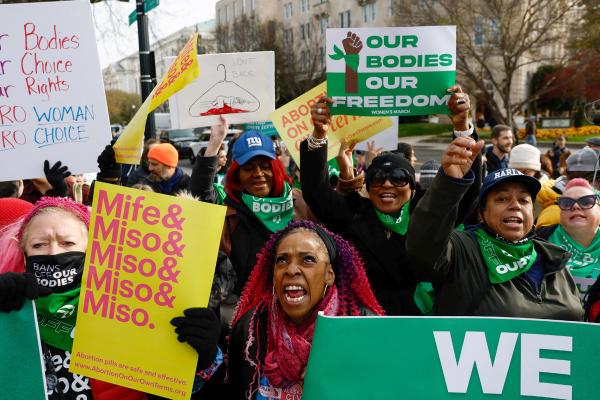
The Supreme Court heard oral arguments March 26 in a case concerning mifepristone, a pill commonly used for abortion. It is the first major case involving abortion on its docket since the high court overturned its previous abortion precedent in 2022.
A coalition of pro-life opponents of mifepristone, which is the first of two drugs used in a medication or chemical abortion, filed suit over loosened restrictions on the drug by the Food and Drug Administration, which included making it available by mail, arguing the government violated its own safety standards in doing so.
The FDA has argued the drug poses statistically little risk to the mother in the early weeks of pregnancy. Data from the Centers for Disease Control and Prevention shows that more than half of the abortions performed in the U.S. are chemical or medical, rather than surgical.
During oral argument, justices from across the court's ideological spectrum appeared skeptical that the coalition of pro-life doctors challenging the reduced regulations had legal standing to bring the lawsuit, with the question of standing becoming more of a focus than whether the FDA acted lawfully.
Justice Amy Coney Barrett noted the doctors who submitted declarations in the case — Drs. Christina Francis and Ingrid Skop — appeared neither to have participated in such an abortion nor could they demonstrate injury from the FDA. The doctors instead had argued in filings they could potentially treat a woman facing complications from the drug.
"The fact that she (the doctor) performed a D&C does not necessarily mean that there was a living embryo or fetus, because you can have a D&C after a miscarriage," Barrett said, referring to a procedure called dilation and curettage, which is sometimes performed as abortion but is also sometimes used to treat a miscarriage.
Solicitor General Elizabeth B. Prelogar argued that existing federal conscience protections, allowing medical providers to opt out of providing procedures to which they object, protect the doctors in question.
First approved by the FDA in 2000, mifepristone blocks the hormone progesterone, which maintains proper conditions in the uterus during pregnancy. The drug is paired with misoprostol (initially created to treat gastric ulcers) as part of a chemical regimen for early abortion.
More recently, the same pill combination also has been prescribed to women who experience early pregnancy miscarriage in order to expel any fetal remains and residual pregnancy tissue from the womb. The American College of Obstetricians and Gynecologists updated its protocols to recommend a combination of mifepristone and misoprostol as more effective than misoprostol alone for early miscarriage care based on research published since 2018.
In June 2022, the Supreme Court issued its Dobbs v. Jackson Women's Health Organization decision, which overturned Roe v. Wade and its related precedents that made abortion access a constitutional right. The Dobbs decision returned the matter of regulating or restricting abortion back to the legislature.
Pro-life critics of mifepristone argued that the FDA acted improperly in loosening the regulations surrounding its access, while supporters of the drug claimed it is safe for women and was being targeted for political purposes. Protesters on both sides of the debate gathered outside the Supreme Court during arguments.
Jeanne Mancini, president of the national March for Life organization, said in a statement, "The FDA's removal of nearly all safeguards around the dangerous abortion drug mifepristone has needlessly put women and girls at risk for suffering severe — even life-threatening — complications without the ongoing care of a medical provider."
The USCCB submitted an amicus brief in the case in February.
A ruling in the case is expected by the end of the court's term, which typically ends in June and would be in the midst of the 2024 presidential campaign.
Please read our Comments Policy before posting.
Article comments powered by Disqus Planned Parenthood’s report shows increase in abortions
Planned Parenthood’s report shows increase in abortions
 Decline to Sign campaign for abortion amendment begins
Decline to Sign campaign for abortion amendment begins
 Alabama Supreme Court rules frozen embryos are children
Alabama Supreme Court rules frozen embryos are children
 Don’t sign new abortion petition, Bishop Taylor asks
Don’t sign new abortion petition, Bishop Taylor asks
 Knights support the novena for life in five parishes
Knights support the novena for life in five parishes
 The devil? Don't 'self-diagnose': follow Church guides
The devil? Don't 'self-diagnose': follow Church guides
 Planned Parenthood’s report shows increase in abortions
Planned Parenthood’s report shows increase in abortions
 Studio 3:16 offers new approach to teaching religion
Studio 3:16 offers new approach to teaching religion
 After three decades, NLR principal plans to retire
After three decades, NLR principal plans to retire
 CHS athlete overcomes odds to reach collegiate goal
CHS athlete overcomes odds to reach collegiate goal
 St. Joseph a model of solidarity with immigrants
St. Joseph a model of solidarity with immigrants
 Two gifts after Jesus’ death: Virgin Mary and Eucharist
Two gifts after Jesus’ death: Virgin Mary and Eucharist
 Why we have an altar, and not just a communion table
Why we have an altar, and not just a communion table
 Pope: Wars should be resolved through nonviolence
Pope: Wars should be resolved through nonviolence
 Living relationship with Jesus Christ in the Eucharist
Living relationship with Jesus Christ in the Eucharist